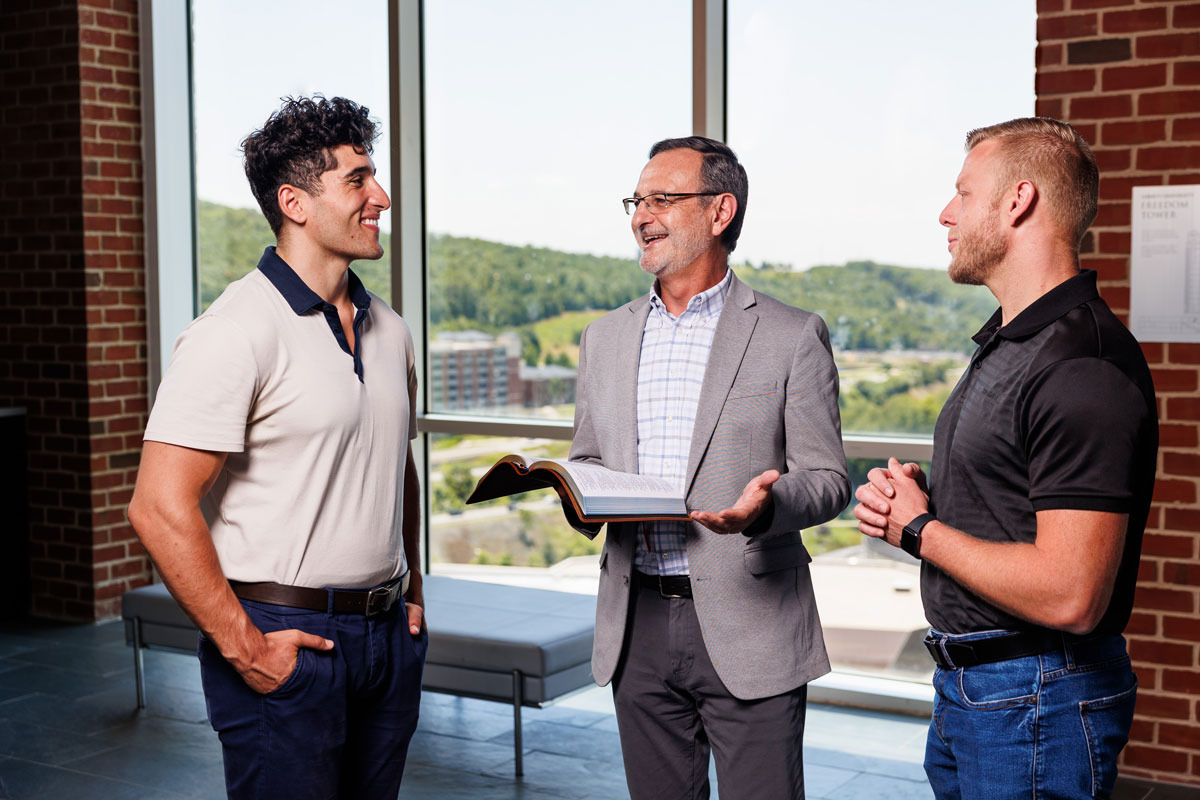Search News Archives
Filter News Articles
Additional Navigation
Research Week features student presentations, lecture by Duke health and faith expert
April 12, 2017 : By By Drew Menard/Liberty University News Service
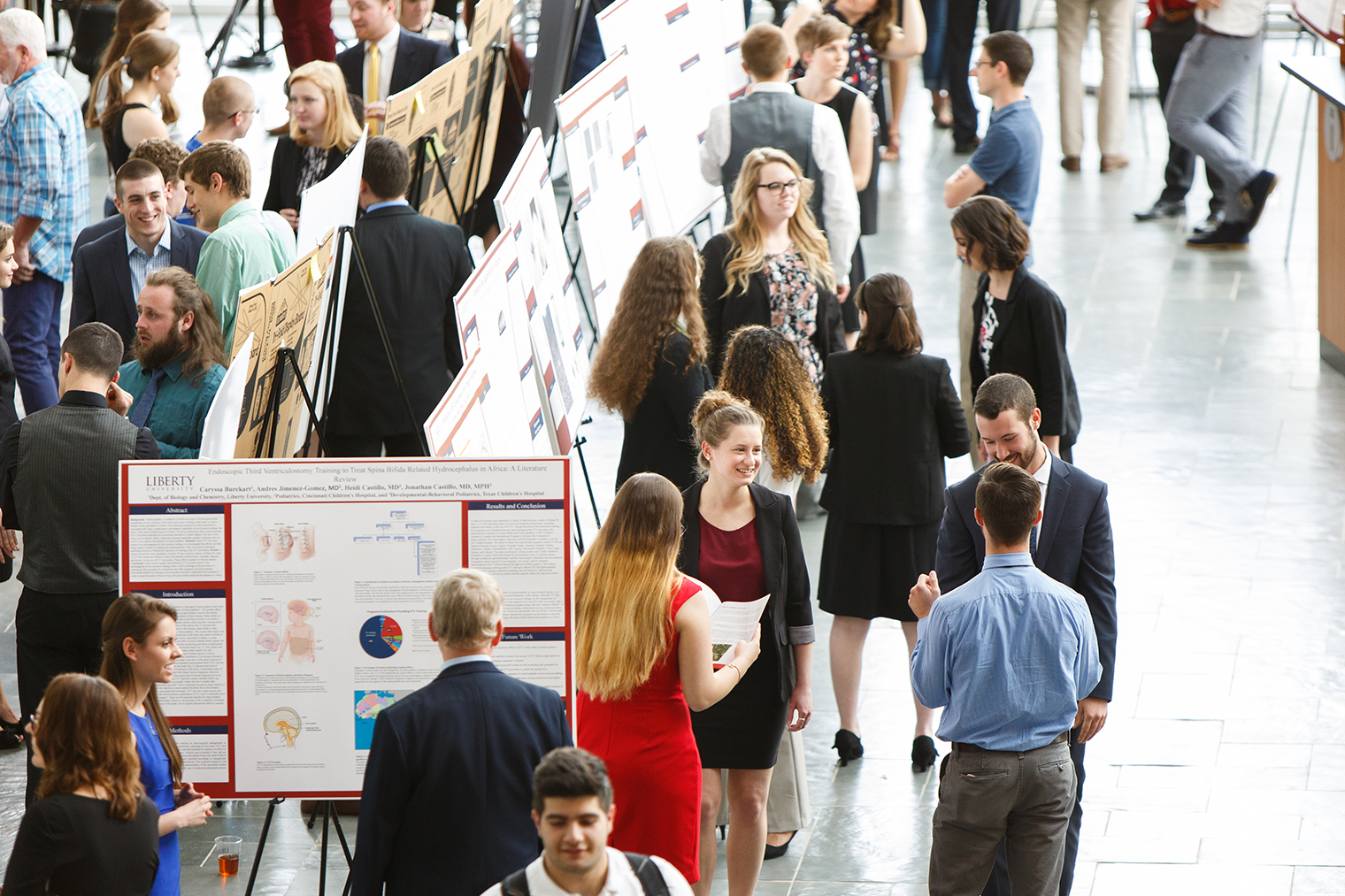
Liberty University’s second-annual Research Week, coordinated by the Center for Research & Scholarship, kicked off Monday in the Jerry Falwell Library Esbenshade Atrium. More than 45 poster presentations were on display, putting the spotlight on undergraduate and graduate research projects from a number of disciplines.
On one end of the room, Doctor of Education student Patricia Meulemans explained the persistence of Latinas in higher education Science Technology Engineering and Mathematics (STEM) programs while, in another area, American Sign Language and Interpreting junior Mariah Beverage described how mental health ASL interpreters cope with vicarious trauma induced on them by clients.
Students studying chemistry, history, English, divinity, and more were also among the presenters.
“I really like this opportunity to educate the community,” Beverage said. “Because of Research Week, I have this ability to not only share with people, but also get my work published. It opens prospects, and, going into this field, I can raise awareness through research.”
Carson Smith, a junior studying cell and molecular biology, said she appreciates the opportunity to overcome her fear of public speaking. She smiled brightly and spoke clearly, betraying any discomfort as she described her research proposal to test microspheres for optimal drug delivery.
“I love research. It is so important for undergraduates to get that experience,” she said, noting that without research many undergraduates may miss the opportunity to discover their career passion. “I think it is really important that Liberty gives us that opportunity and has made that a focus. I appreciate it; Liberty has been very supportive.”
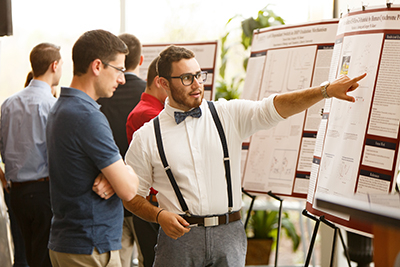
Junior Karl Lagrange Ocius, a chemistry major testing a new way to synthesize benzaldehyde, a chemical compound, said he is “amazed and grateful” to have the support to do research as an undergraduate.
“This is not something I thought I would be doing in college,” the 21-year-old said as he pointed to the chains of hexagons and lines, illustrating the compounds, on his poster. “It is something you picture grown-ups doing at 40 or 50 years old.”
Right next to him, his research partner, senior biomedical sciences major Stephen Martin, agreed.
“A lot of other schools don’t have this option (to conduct undergraduate research), at least not to the full extent that Liberty does,” he said. In addition to his work with Ocius, Martin was also sharing work he did as part of a long-term investigation on strains of Staphylococcus aureus (which can cause Staph infections) and their sensitivity to various antibiotics. “That drive for research is everything. Everything we read in a textbook is old research that someone dedicated hundreds of hours to in a lab. To me, it (research) is training us to be good scientists, to interpret good data and to present that data.”
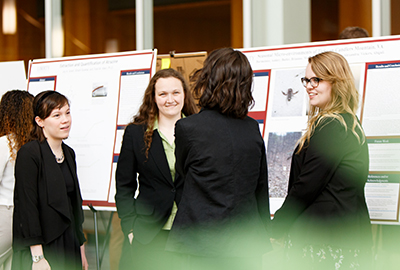 Research Week promotes Liberty’s Quality Enhancement Plan, which focuses on learning through research and scholarship. This year saw a significant increase in submissions, leading to a higher number of presenters sharing research posters, giving oral presentations, or both. An automated application and judging system developed by Liberty’s Information Technology Department established an infrastructure to effectively grow participation. Students in Liberty’s online education programs are also able to participate in Research Week, thanks to the university’s technology partnerships. Remote presentation participation nearly doubled from last year.
Research Week promotes Liberty’s Quality Enhancement Plan, which focuses on learning through research and scholarship. This year saw a significant increase in submissions, leading to a higher number of presenters sharing research posters, giving oral presentations, or both. An automated application and judging system developed by Liberty’s Information Technology Department established an infrastructure to effectively grow participation. Students in Liberty’s online education programs are also able to participate in Research Week, thanks to the university’s technology partnerships. Remote presentation participation nearly doubled from last year.
A special guest lecture was held in the Science Hall Monday evening to help commence Research Week. Dr. Harold Keonig, director of the Center for Spirituality, Theology and Health at Duke University Medical Research Center, presented an extensive case for the role of religion in personal health. He explained that across numerous studies related to all areas of health and disease, it has been found that devoutly religious individuals (who regularly attend religious services) are healthier overall. For example, religious individuals are less susceptible to suicide and substance abuse, less depressed, more grateful, more generous, more socially connected, and display more positive emotions when dealing with stress or tragedy. In addition to these psychological factors, he said devoutly religious people also have better immune functions, better endocrine functions, faster recovery times from and a lower mortality rate after open heart surgery, a lower cancer mortality rate, and more positive statistics in cardiovascular hazard ratios. Koenig even showed MRI brain scan images that support his case.
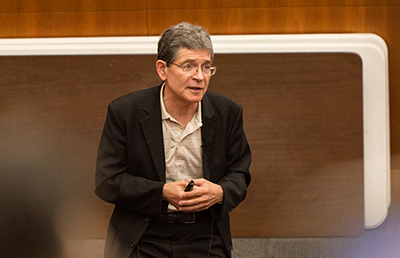
“It all starts with this attachment to God,” Koenig said. He pointed out that secular institutions are conducting these studies, which continue to strengthen the case, but no one is talking about the importance of religion in society in higher education. “Religion is involved in better mental health, physical health, and greater longevity. Rational explanations exist for these relationships. These have implications for individual and community resilience.”
Students will continue giving research presentations in the library through Friday, from 1-4 p.m.
“We hope all students and faculty will encourage these students who will be presenting at Research Week 2017 by attending their sessions throughout the week,” said Dr. Darren Wu, associate director of the CRS. “We want the entire Liberty community to help us to recognize and celebrate their hard work.”
As an incentive to presenters, cash prizes will be awarded to the top three graduate and top three undergraduate presentations, as evaluated by faculty judges, in five poster and five oral presentation categories.

